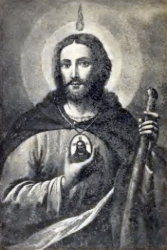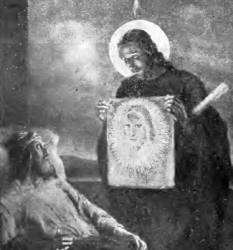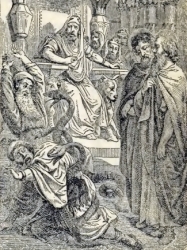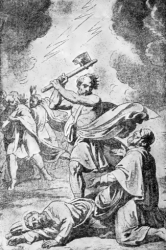 History According to Tradition
History According to Tradition History According to Tradition
History According to Tradition
Great and ardent should be our devotion to the holy apostles, because they were the first teachers of our Faith. During the glorious Middle Ages the apostles were held in high veneration, but, sad to say, in our materialistic age this devotion has become tepid, especially with regard to the holy apostle Saint Jude Thaddeus, whose feast we celebrate on 28 October. By reason of the shameful treason of Judas Iscariot against our Savior, the name of Judas fell into such disrepute, that even the apostle Jude Thaddeus suffered thereby. Within the last few decades, veneration to this glorious apostle has been revived. It seems that our Divine Redeemer wishes to repair the honor of Saint Jude by granting favors, and frequently giving aid to those in extreme distress, on condition that they invoke this saint. Our Lord Himself, in a vision, directed Saint Bridget of Sweden to turn with great confidence to Saint Jude. "In accordance with his surname 'Thaddeus' - 'the amiable, loving' - said Jesus, "he will show himself most willing to give help." Saint Jude is called the patron of hopeless and desperate cases, owing to the singular help he has obtained for his clients in grave necessities. To strengthen our confidence in this blessed apostle, let us hear something of his life from revelation and tradition.
The holy apostle Jude bears the surname "Thaddeus" to distinguish him from Judas Iscariot, the traitor. Besides the apostle James the Less, Jude had two more brothers who together with himself are called the "brethren of Jesus" in the Holy Gospel (Matthew 13:55). In Hebrew this expression signifies a near relationship. His father was Cleophas. On account of his bold and fearless confession of the resurrection of Christ, Cleophas was murdered by the Jews and thus won the crown of martyrdom. The mother's name was Mary. She was a near relative of the Blessed Virgin. After her death, the holy remains of Mary Cleophas were glorified by great miracles.
Saint Jude was brought up by his parents as a pious and innocent youth. In his boyhood he must have frequently associated with Jesus. No mention is made of Jude's occupation before his call to the apostolate, but we may well surmise that when our Savior began His public life, Jude Thaddeus abandoned everything to accompany Him. How great must have been the surprise and joy of our holy apostle when he witnessed the first miracle of his Lord and Master at the marriage feast of Cana! From the time when Jude was chosen an apostle, he labored with indefatigable zeal, particularly for the conversion of the Gentiles.
Cure of the King of Edessa
 In most countries of Europe, Saint Jude is represented as wearing a miniature of our Lord on his breast. The following is the tradition attached thereto: The fame of our Lord's miracles having reached Abagaro, King of Edessa, the monarch, who was afflicted with leprosy, sent a messenger begging Jesus to come and cure him. Receiving an answer that our Lord could not gratify him then, the king sent an artist to Jerusalem for the purpose of at least obtaining our Lord's portrait. But the poor artist, blinded by the splendor and brightness emanating from our Savior's Face, was unable to draw a single line. Jesus, moved by compassion, and wishing to console Abagaro, held a cloth to His Face, and impressed the image of His sacred Countenance thereon. Then He handed it to the painter to carry back to his sovereign, with the promise to send someone to cure him. It is related that this mission was confided to Saint Jude Thaddeus, who after our Lord's ascension proceeded to Edessa.
In most countries of Europe, Saint Jude is represented as wearing a miniature of our Lord on his breast. The following is the tradition attached thereto: The fame of our Lord's miracles having reached Abagaro, King of Edessa, the monarch, who was afflicted with leprosy, sent a messenger begging Jesus to come and cure him. Receiving an answer that our Lord could not gratify him then, the king sent an artist to Jerusalem for the purpose of at least obtaining our Lord's portrait. But the poor artist, blinded by the splendor and brightness emanating from our Savior's Face, was unable to draw a single line. Jesus, moved by compassion, and wishing to console Abagaro, held a cloth to His Face, and impressed the image of His sacred Countenance thereon. Then He handed it to the painter to carry back to his sovereign, with the promise to send someone to cure him. It is related that this mission was confided to Saint Jude Thaddeus, who after our Lord's ascension proceeded to Edessa.
A supernatural splendor shone about Saint Jude when he was presented to King Abagaro. Perceiving this, the sovereign knelt, saying, "Art thou the disciple of whom Jesus spoke: 'I will send you one of My disciples who will cure your malady, and give life to you and your subjects'?"
Thaddeus replied, "Thou hadst faith in the Lord Jesus; therefore He sent me."
"I believe in Him," continued Abagaro, "and my faith is such that I would have sent my army to destroy the Jews who put Him to death had not the Roman army been an obstacle."
"He fulfilled the will of His Father," responded Thaddeus, "and after death rose glorious and triumphant, and returned to His Father. Saint Jude then placed his hands on Abagaro, who was instantly cured of his infirmity. Many citizens were also healed, and on being instructed, the king, his court and almost the entire kingdom were converted to Jesus Christ.
Conversion of Barbarians
After firmly establishing the Church in Edessa, the Apostle Saint Jude visited the whole of Mesopotamia, preaching the Gospel, and everywhere increasing the number of the faithful. This occupied about ten years. Having returned to Jerusalem for the Council of the Apostles, Saint Jude afterwards joined Saint Simon in Libya, where the two apostles diffused the light of the Gospel among the barbarian inhabitants. They then set out for Persia where God had reserved for them an abundant harvest. It is impossible to compute the number of the converted or to describe the change in the manners and customs of that savage people.
Before the arrival of the two apostles the laws and habits of the Persians were iniquitous. The marriage tie was totally disregarded - the dead were thrown into the fields to become the food of wild beasts, and other barbarities prevailed. Taught by the apostles the noble and generous sentiments of the true religion, these people soon became the admiration of other Christians. Barbarity was replaced by gentleness, cruelty by Christian charity, impiety by evangelical perfection.
Apostolic Labors in Persia
 In Persia the two apostles were continually thwarted in their teaching by two magicians named Zaroes and Arfaxat, who endeavored by their art and incantations to uphold the worship of the idols. At every step they confronted our apostles and denounced them as impostors, but were always defeated by the two saints, who invariably exposed their tricks and impostures. In the presence of Saint Jude and Saint Simon, the idols refused to answer their false priests, but when the apostles, in the name of God, commanded them to speak, they were forced to acknowledge the saints as the disciples of the true God. The saints then ordered the demons inhabiting the idols to quit them, in doing which, they howled with rage and shattered the images.
In Persia the two apostles were continually thwarted in their teaching by two magicians named Zaroes and Arfaxat, who endeavored by their art and incantations to uphold the worship of the idols. At every step they confronted our apostles and denounced them as impostors, but were always defeated by the two saints, who invariably exposed their tricks and impostures. In the presence of Saint Jude and Saint Simon, the idols refused to answer their false priests, but when the apostles, in the name of God, commanded them to speak, they were forced to acknowledge the saints as the disciples of the true God. The saints then ordered the demons inhabiting the idols to quit them, in doing which, they howled with rage and shattered the images.
On entering the camp of Verardach, commander-in-chief of the Persian army, the two apostles met the same magicians, Zaroes and Arfaxat. The Persians were preparing to march against an army from India, and Verardach was anxious as to the outcome of the war. "We know you are more powerful than our gods," the commander said to the apostles, "for at your approach the idols fell to the ground. After the war is over we will gladly listen to your teaching. Tell us what the result of this war will be."
The apostles commanded the demons to answer. Questioned by their priests, the idols replied that the war would be long and many would perish on both sides. Verardach was troubled. "Fear not, O Prince, your gods lie!" joyfully exclaimed the two apostles. "Tomorrow at this same hour, ambassadors will arrive from your enemy to conclude negotiations of peace."
On the following day the ambassadors from India arrived at the hour designated by the two saints and terms of peace were agreed upon. The prince, indignant at the false prophecies of the wicked magicians, ordered them to be burned alive, and likewise all who maligned the holy apostles'. But Saints Simon and Jude interceded with the commander and the punishment was averted.
Filled with admiration for the two holy apostles, Prince Verardach conducted them to the King of Persia. Here also they performed miracles in order to frustrate the wicked designs of the magicians who had preceded them. Everywhere great numbers were converted to the Faith. In all the towns and villages traversed by Saints Simon and Jude, they found that the magicians had gone before to prejudice and incite the people against them, but at the approach of the apostles the impostors invariably fled.
Once a number of idolatrous priests had assembled before their king and brought the two apostles for condemnation. The priests held charmed serpents in their hands and set them loose upon the apostles. The snakes, however, turning upon the idolatrous priests, encircled and bit them until the apostles commanded the reptiles to cease. Some serpents were laid on the ground and the apostles were commanded to take them up. They did so, and held them to their breast beneath their mantle without being bitten. The priests were then told to take up the snakes: when they took hold of them, the reptiles bit their hands and curled around them, causing the priests to scream fearfully. At sight of this wonder, many people became Christians, also the king.
Saint Jude's Epistle
Our holy apostle seems to have been among the last of the twelve to die for his Savior, as he implies by the seventeenth verse of his epistle: "My dearly beloved, be mindful of the words which have been spoken before by the apostles." The words of his epistle are in keeping with the amiable disposition which tradition ascribes to him. "My beloved," he writes, "building yourselves upon your most holy Faith praying in the Holy Ghost; keep yourselves in the love of God, waiting for the mercy of our Lord Jesus Christ unto life everlasting." (1:20-21)
Though the epistle of Saint Jude is one of the shortest in the New Testament, it is remarkable for the strength and grandeur of its language. It applies clearly to the eventful times in which we now live. The profound humility of Saint Jude shines forth in a singular manner in his epistle. Far from calling himself a relative of Jesus, though he was such, Saint Jude terms himself a servant of Jesus Christ. He was filled with a holy zeal for the doctrine of Christ and the salvation of souls.
Saint Jude preached amid untold sufferings and persecution in Judea, Samaria and Idumea, but especially in Mesopotamia where the people were sunk in the dregs of immorality. This gentle apostle, however, knew how to impress upon them the beauty of Christian purity. Doubtless it is in reward of his zealous labors to teach this virtue to the pagans, that God now glorifies Saint Jude by giving him special power to aid those tortured by the spirit of impurity.
Martyrdom
 The numberless souls brought to accept the true religion by Saint Jude, aroused the hatred of unbelievers and secured for our holy apostle the coveted crown of martyrdom. Authorities differ as to the manner of his death. Tradition states that he was beaten with clubs and his head cleft with a broadax.
The numberless souls brought to accept the true religion by Saint Jude, aroused the hatred of unbelievers and secured for our holy apostle the coveted crown of martyrdom. Authorities differ as to the manner of his death. Tradition states that he was beaten with clubs and his head cleft with a broadax.
His body was brought to Rome, and is now honored in Saint Peter's basilica. Pope Paul III, in a brief dated 22 September 1548, granted a plenary indulgence to all who visit his tomb on his feast, which is celebrated 28 October. This shows us that even in the Middle Ages, devotion to Saint Jude flourished, for the grant of a plenary indulgence was then very rare. Though the body of the holy apostle rests at Saint Peter's in Rome, his helpful, living charity is diffused throughout the world and in every country his clients experience wonderful help in difficulties and trials of the most hopeless nature.
Powerful Helper in Extreme Need
Saint Jude Thaddeus shows his particular assistance and protection in circumstances deemed most difficult and desperate. His aid has been widely experienced, for he is universally known as the "Patron of hopeless and desperate cases." From earliest times he has been considered a helper in urgent need. Thousands who have implored his aid, have received extraordinary and miraculous help in cases which, according to all human calculations, seemed hopeless.
Venerable Columba of the Order of Saint Dominic realized how pleasing it is to God if we zealously venerate the holy apostle Thaddeus and promote his honor, because he is so little known and loved. She understood that by venerating this saint, one can obtain assistance in difficulties where help is despaired of, in trials and afflictions of a grave and serious nature.
Saint Jude has obtained recovery for those stricken with maladies which defy all human skill and remedies; he has obtained grace for persons to overcome deeply rooted evil habits - those afflictions of the soul which are far more difficult to cure than any bodily ailment. Saint Jude comes quickly and speedily to the aid of those tormented by impure thoughts and enslaved by impure habits. Our holy apostle obtains help in anguish, distress, calumny, poverty, misery, yea, even in despair and in circumstances where aid seems utterly impossible. In return, he demands our confidence, love and gratitude; if our requests are not immediately granted precisely according to our own ideas and wishes, they surely will be sooner or later according to the designs of God.
A shining example of veneration of this holy apostle is given us by Saint Bernard of Clairvaux, who during his whole life highly honored a relic of Saint Jude, and asked that in death the relic be placed upon his breast and buried with him, that, as he said, he would not be entirely without him whom in life he had found to be a powerful protector of his purity, and a potent helper in every circumstance.
Let all who are in tribulation be animated with confidence in the intercession of Saint Jude, for the miraculous virtue of our prayers proceeds from confidence, says the servant of God, Ven. Anna Catherine Emmerich. Let not this holy apostle be justified in complaining that we do not avail ourselves of his merits and powerful protection. He is the helper, the consoler of all oppressed with heavy trials. Let us say with confidence:
Saint Jude, pray for us.
And for all who invoke thy aid.
How to Obtain the Aid of Saint Jude
Holy Mass
One of the most powerful means to obtain the aid of Saint Jude in special needs and distress, is to have the Holy Sacrifice of the Mass offered in his honor. Nothing gives greater pleasure to the saints than if we otter a Holy Mass in their honor. In great affliction, or to obtain a special favor, one may have a triduum of three Masses or a novena of nine Masses offered in honor of this holy apostle, or assist at Holy Mass for such a number of days, imploring his aid. Elsewhere in this file you will find an "Offering" which may be recited after the Consecration at every Holy Mass offered in honor of Saint Jude.
Holy Communion, Novenas, Prayers
Make novenas in honor of Saint Jude. Approach Holy Communion in his honor when you ask your favor, and again in gratitude when Saint Jude obtains it for you. Also say the "Our Father," "Hail Mary" and "Glory be to the Father," each three times.
Choose nine Sundays to practice special devotion to Saint Jude. Certainly firm confidence in this saint will be bountifully rewarded. God has ordained that He will grant the assistance of His grace to those who in desperate need and abandonment take refuge to Saint Jude Thaddeus.
Advice in Grave Difficulties
To those who take refuge to Saint Jude, it will be of untold benefit, if they give ample alms or perform some other work of mercy in his honor. Nothing gives us a surer pledge of the help of God and the intercession of the saints than works of mercy. Saint Leo says, "Prayer has the greatest efficacy to obtain favors from God when it is supported by works of mercy." And Saint Gregory of Xazianzen writes, "The merciful have the key to the treasures of God."
Lefer, a pious priest, asserts, "Persons of all classes in the most desperate situations came to me. Frequently all means failed to obtain the longed-for grace until I said to them: 'Practice charity.' If they followed this advice, they invariably received help." "Give to the poor and receive the kingdom of heaven," says Saint Methodius. Alms have the power of canceling our debt of sin. A mystic teacher writes: "If there were no poor, there would not be so many mortal sins remitted. The poor are the physicians of our wounds. We can never give the poor as much as we receive from them, because for the piece of bread we give them they issue a ticket to heaven for us."
That is why so many charitable men die a good death, even though they have been great sinners. It is the pronounced experience of many saints and learned men and confessors, that sinners who willingly give alms will not die impenitent. One saint says, "Never have I seen a charitable person end with a bad death."
In most beautiful and reassuring wTords, Holy Scripture recommends and declares the reward of almsgiving, "Blessed is he that understandeth concerning the needy and the poor: the Lord will deliver him in the evil day" (Psalm 40:1). Yes, surely the one who is compassionate toward the poor will receive mercy at the hour of death.
Be assured then, devout reader, that alms-giving in honor of Saint Jude will incline this amiable apostle to succor you in your most hopeless and desperate necessities, as many of his clients have already experienced.
text and images taken from Saint Jude Thaddeus, Helper in Desperate Cases by the Benedictine Convent of Perpetual Adoration of Clyde Missouri, 10th edition, 1931. It has the Nihil Obstat of Philippus, Abbas Neo-Angelo Montanus, and the Imprimatur of +Franciscus, Episcopus Sancti Josephi